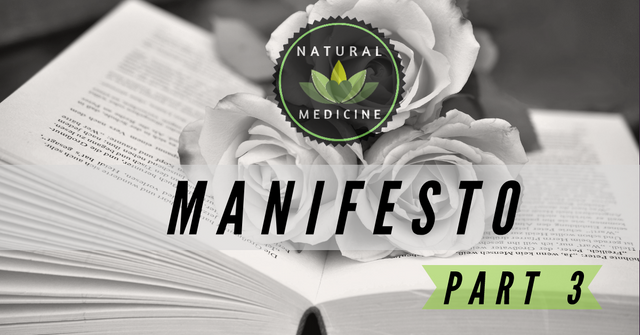Systems In Nature - The NaturalMedicine Manifesto Part 3
An exploration of an emergent ethos
In this series of posts, we will explain the ground from which emerges the values and ethos that drives and sustains the NaturalMedicine community on Steem. This is the basis on which choices are made for creating and curating #naturalmedicine content. It draws on the models found in natural systems to create and establish creative, thriving, sustainable communities. As a whole, it forms a manifesto that the community draws on for inspiration, discussion, and inter-personal discovery.


If you haven’t read Part 2 What does ‘natural’ mean? we invite you now to read that first. Otherwise, please continue …
In the previous post we began to explore what we mean by ‘natural’, and we realised that the definition that comes to mind immediately is quite narrow… or in fact, a little too broad.
While ‘nature’ can certainly include everything that exists in the universe (galaxies, nebulae, stars, black holes, etc.), for the purposes of our discussion we really are just staying within the terrestrial sphere and referring to natural life on Planet Earth.
Ever since the groundbreaking work of people such as Gregory Bateson, James Lovelock, David Suzuki, David Attenborough, Rupert Sheldrake, James Gleick, and many others we are beginning to understand that the natural world is a complex system of inter-relatedness and inter-dependence. No matter where we look, no matter how deep or shallow we look, we can identify ‘systems’.
This seems to be the most succinct definition I’ve been able to find courtesy of Wikipedia. It is a solid introduction to the idea, and has links to excellent further reading and cited references:
Every system is delineated by its spatial and temporal boundaries, surrounded and influenced by its environment, described by its structure and purpose or nature and expressed in its functioning.
These are the key concepts again, courtesy of Wikipedia:
- System: An organised entity made up of interrelated and interdependent parts.
- Boundaries: Barriers that define a system and distinguish it from other systems in the environment.
- Homeostasis: The tendency of a system to be resilient towards external factors and maintain its key characteristics.
- Adaptation: The tendency of a self-adapting system to make the internal changes needed to protect itself and keep fulfilling its purpose.
- Reciprocal Transactions: Circular or cyclical interactions that systems engage in such that they influence one another.
- Feedback Loop: The process by which systems self-correct based on reactions from other systems in the environment.
- Throughput: Rate of energy transfer between the system and its environment during the time it is functioning.
- Microsystem: The system closest to the client.
- Mesosystem: Relationships among the systems in an environment.
- Exosystem: A relationship between two systems that has an indirect effect on a third system.
- Macrosystem: A larger system that influences clients, such as policies, administration of entitlement programs, and culture.
- Chronosystem: A system composed of significant life events that can affect adaptation.
Systems Theory itself can be applied in any context, not just natural systems — but the theory itself can be quite overwhelmingly intellectual when reading primary source material.
Of course, humans have known about Systems Theory for millennia; we may not have had scholarly texts and tonnes of scientific research on it, but we had access to a very immediate example of a system and how it operates: the natural world!
We’ve been observing these key features of systems in nature since we became sentient and expressing ourselves. To this day, we cannot find any evidence to the contrary that nature works any other way.
In nature, organisms will mostly band together in communities, and inter-relate with other organisms in some way in order to live, grow, and thrive. And for the most part, they do so in a perpetual manner — that is, their actions of thrivability are also sustainable. If an action (or interaction) is not sustainable, then there is no chance for future thrivability. In such cases, homeostasis occurs and the organism/s adapt to the change in circumstances.
With the work on cybernetic systems in particular, we have learned about the notion of self-regulation (or self-governing) through reciprocal transactions and feedback loops. Basically, we have learned that nature can govern itself without humans needing to intervene. Be it animal or vegetable, organisms have an instinctual understanding of all of this without needing to learn it or read it in a textbook.
The point is, nature itself is the perfect model for us to understand how ‘natural systems’ operate; we don’t need to have a University Degree in this stuff. Thus, nature itself is our exemplar, our model for understanding how systems operate, and more importantly how to emulate them for our own benefit.
This idea is going to be explored over the next few posts.
Other posts in this series:
Part 1 What Is ‘Natural Medicine’?
Part 2 What does ‘natural’ mean?

Beneficiaries for this post are:
- @lotuscoin 50%
- @naturalmedicine 40%

Did you know that Natural Medicine has it's own front end - https://www.naturalmedicine.io? By using this front end, you not only earn our native token 'LOTUS', but can find other like minded folk posting on everything from herbalism, meditation, healthy eating and essential oils, to homesteading, cannabis and environmental health. If you'd like to delegate to show your support of natural healing wisdoms, and receive benefits from upvotes to great contests and prizes, and help support us curate worthy content, please click here!

Yo dude. Do you write all of this yourself (aside from the referenced articles) ? If so you have a gift with the words. I find this very interesting. Upvoted and following :)
Yeah well I wrote the draft, and others put in their input and edits... thanks for the compliment, I appreciate the feedback
😊🙏🏽☯️
Posted using Partiko iOS
You are killing it! Defining natural is indeed a slipper slope.. I will get back to this when my ability to process returns.. I need some nooooootropics lol...
Had one of those days where all I wanted to do was nap off and once I finally got to it, a fool on sleep consumed me. Now it's 10pm and I feel like I'm starting my day eeek..
Public holiday today got me all out of sorts..
Posted using Partiko Android
Congratulations @metametheus! You have completed the following achievement on the Steem blockchain and have been rewarded with new badge(s) :
You can view your badges on your Steem Board and compare to others on the Steem Ranking
If you no longer want to receive notifications, reply to this comment with the word
STOPWhilst I've already had the pleasure of reading the complete manifesto, I'm loving reading it again. It makes me have a bit more faith in the front end 'righting' itself in a natural way rather than forcing an artificial constraint upon it. Perhaps gentle nudging is okay though :P